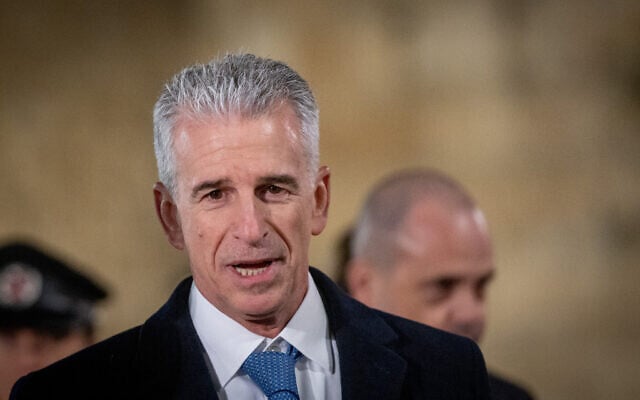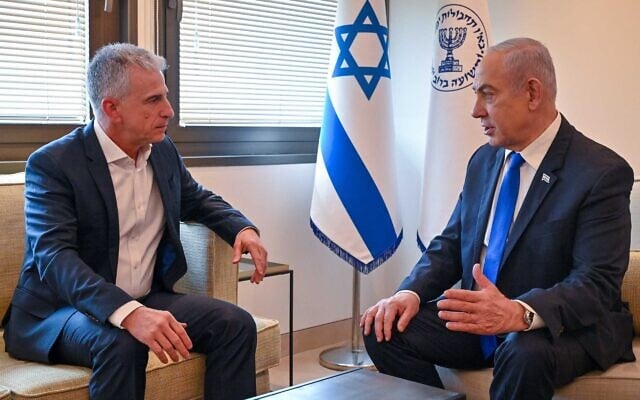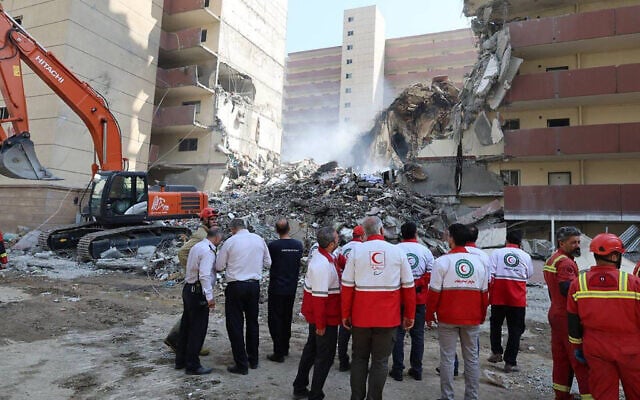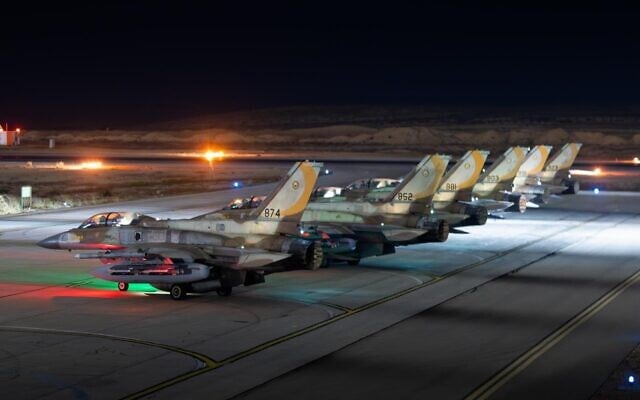


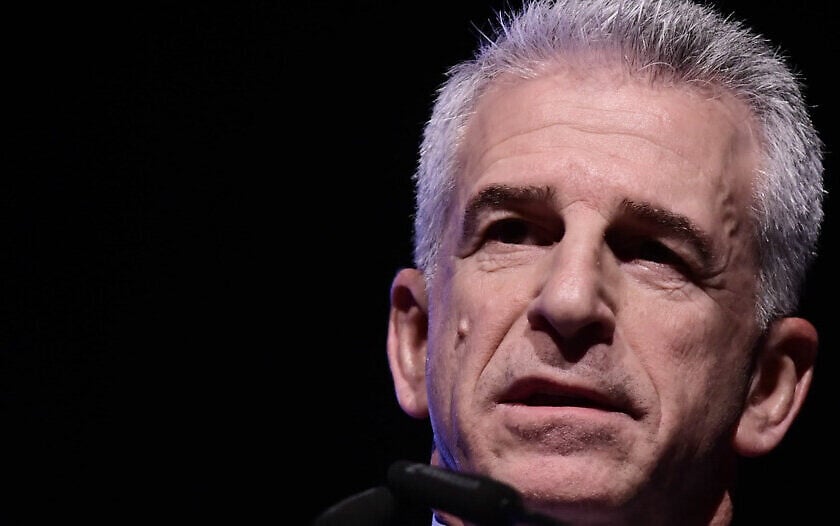
Two key figures spearheaded Prime Minister Benjamin Netanyahu’s dramatic decision to launch sweeping strikes on Iran last week, targeting its nuclear facilities, ballistic missile infrastructure, military leadership, scientists and symbols of the regime: Mossad Director David Barnea and Air Force chief Maj. Gen. Tomer Bar.
Coordination between the Mossad spy agency’s activities on the ground and the Air Force’s strikes from the sky was “down to the millimeter in terms of complexity,” according to a senior Israeli defense official familiar with the details.
“They built an incredible plan, and we haven’t seen everything yet. The drone and beeper operations might pale in comparison to what may happen,” they said.
Unlike in the past, this time it was Mossad that devised the plan, with the military eagerly jumping in to carry it out.
National Security Adviser Tzachi Hanegbi, a longtime advocate for striking Iran, helped push Netanyahu and Israel Defense Forces Chief of Staff Lt. Gen. Eyal Zamir to provide backup support, presenting the plans to the security cabinet, which gave them unanimous approval.
The military’s backing marked a stark departure. Since 2007, every IDF chief—including Gabi Ashkenazi, Benny Gantz, and Gadi Eisenkot — opposed attacking Iran, and the idea seemed to fall off the table with the 2015 nuclear deal between the US and Iran.
This time, it was Mossad operations leading the charge, based on a plan that had been put together by Barnea and his colleagues in the spy outfit over a year and a half.
When he took over the role of Mossad head in 2021, Barnea had concentrated on what was referred to as his “biometric revolution,” transforming the agency’s use of cutting-edge technology.
“Barnea radically changed Mossad,” a senior defense official said. “He flipped the script and reached new heights in the use of technology for things like smart surveillance cameras and facial recognition. It wasn’t easy for him. Mossad is still a conservative organization, and Barnea had to fight many internal battles. In the end, he won and we are seeing the result on the streets of Iran.
“Barnea is a brilliant operator,” the official adds. “He’s thorough, with a different kind of charisma than his predecessor, Yossi Cohen. He’s someone who does the work without seeking headlines, so there’s no chance he’ll give interviews or talk about Mossad operations. Barnea isn’t full of himself. He can change his mind if someone convinces him otherwise. He’s not afraid that people might think he’s weak, unlike some other leaders.”
The 60-year-old approached the Iran issue from a place of basic distrust of the regime and a record of exceptional operational successes in recent years, especially since war broke out on October 7, 2023.
Like Netanyahu, Barnea believed the US should withdraw from the Iran nuclear deal signed by then-president Barack Obama. He was convinced that doing so would change the situation for the better, but on this, his Mossad colleagues were actually right: when President Donald Trump exited the pact in May 2018, the Iranians resumed enriching uranium and advancing toward a bomb.
Barnea made his name in the direct and indirect conflicts with Iran and its proxies. Mossad’s “beeper operation” in September 2024, in which thousands of pagers and hundreds of booby-trapped walkie-talkies blew up in Hezbollah operatives’ hands, stunned the world and proved decisive in the campaign against the Tehran-backed terror group.
The spectacular assassination of Ismail Haniyeh in Tehran in July 2024 is also to the credit of Barnea and Mossad.
Along the way, there was the killing of Hezbollah leader Hassan Nasrallah and now assassinations of senior Iranian figures one after another on their own soil, via precision air strikes relying on information from Military Intelligence and Mossad.
Earlier this week, the Wall Street Journal revealed that over the course of years, Mossad had managed to smuggle components for drones and munitions into Iran, inside suitcases, trucks, and shipping containers.
The parts were assembled inside Iran, then hidden away until the green light came on Friday. As fighter jets streaked toward Tehran, Natanz and other sites, the drones were activated and deployed against missile sites and air defense systems, clearing the way for the Air Force’s planes.
“Barnea understood there was no choice this time, we had to launch a full-scale offensive on Iran,” the defense official said. “We always knew the Iranians thought we wouldn’t act. They said we didn’t have the capability and feared their retaliation. They saw that US President Joe Biden hesitated and did not support it, and also that Trump wasn’t eager for a strike on Iran.”
“The Iranians thought all the threats against them were nonsense, and nothing would actually happen, so they kept advancing,” they added. “Now they are living those mistakes.”
The official expressed pride in the fact that Israel had managed to shock Iran.
“Since Thursday, it has not been the same arrogant country so confident in itself, but a state that is shaken and wants to go back to the [nuclear] deal,” they boasted.
Despite the successful start to the campaign, the official indicated that how it ends may largely depend on whether Trump decides to bring the US in as well.
“From Israel’s perspective, the ideal outcome now would be for the US to enter the fray so we can push forward together,” they said. “In that case, Iran wouldn’t stand a chance, and then perhaps we will be able to say that the IDF-Mossad plan to eliminate the nuclear threat concluded with a major victory.”
Barnea’s term is set to expire in June 2026, unless the government decides to extend it by one more year. Should he envision a future for himself in politics, regulations dictate that he must first wait a three-year “cooling-off” period. But once that ends, he’ll likely be a hot prospect. Few are the political parties that would not want someone like him in a senior position, perhaps even as party head, though that won’t happen.
He has the capabilities to lead, but not the drive.
“Barnea is not the kind of person who is going to fight it out in the media or engage in political brawls on his way to the top,” said the senior official, who knows the Mossad chief well. “Sometimes you have to go negative to fulfill your lifelong dreams, but the Prime Minister’s Office, that’s not what Barnea is dreaming of.”

